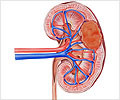HIF-2 inhibitors are a promising target to combat kidney cancer which is more effective and better tolerated than the current drug sunitinib.

‘HIF-2 inhibitors work by suppressing the effects of HIF-2 which include downregulating the protein VEGF that promotes the formation of blood vessels needed for tumor growth. It targets only the cancer cells and therefore does not cause cardiac toxicity or hypertension.’





Research on HIF-2 inhibitors began more than 20 years ago at UT Southwestern Medical Center. This worked by interfering with processes that fuel the growth of cells.Investigators conducted a pre-clinical trial in mice transplanted with kidney cancer from over 20 patients and showed that the HIF-2 inhibitor PT2399 controlled cancer in half of the tumors, according to a study published in the journal Nature.
"This is a completely new treatment for kidney cancer. We want to make HIF-2 inhibitors available to patients and are currently carrying out clinical trials," said Dr. James Brugarolas, Director of the Kidney Cancer Program, who is leading an $11 million SPORE grant from the National Cancer Institute seeking to translate new discoveries into novel therapies for kidney cancer patients.
HIFs or hypoxia-inducible factors, like HIF-2, allow the body's cells to adjust to low-oxygen environments. HIFs activate programs that promote the development of blood vessels, facilitate oxygen delivery and promote efficient nutrient utilization. Kidney cancer cells hijack the same system to fuel their growth.
HIF-2 inhibitors work by suppressing the effects of HIF-2 which include downregulating an important protein called VEGF that promotes the formation of blood vessels needed for tumors to grow.
Advertisement
In a previous report, Dr. Kevin Courtney, Assistant Professor of Internal Medicine and a coauthor of the current study, reported at the American Association of Clinical Oncology annual meeting that HIF-2 inhibitors were safe in patients and had activity even in heavily pretreated patients. Investigators show that HIF-2 inhibition was able to control metastatic kidney cancer even after 7 lines of prior therapy.
Advertisement
"Furthermore, it was also better tolerated. As sometimes happens in patients, mice on sunitinib were sickly and lost weight, whereas mice on the HIF-2 inhibitor gained weight while on the study," he said.
Researchers surprisingly found a subset of tumors that do not respond to the drug, but were able to identify biomarkers that, once verified, would help determine which patients are more likely to benefit from HIF-2 therapies.
"HIF-2 is believed to be the most important driver of kidney cancer. Traditionally, proteins like HIF-2 were disregarded as drug targets because their shape made it nearly impossible to design drugs against them," Dr. Brugarolas said. "The approaches we have taken pave the way for identifying drug candidates for other proteins that have traditionally been considered undruggable."
HIF-2 also appears significant in other types of cancer, including deadly brain cancers called glioblastomas and non-small cell lung cancer, the most common type of lung malignancy.
Source-Medindia















